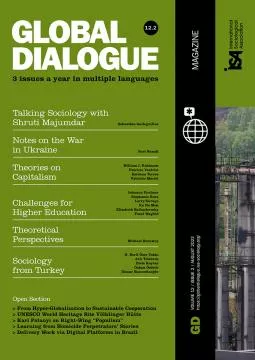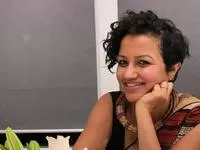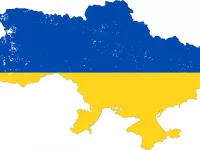GD 12.2 - August 2022

Global Dialogue is available in multiple languages!
Select the language to download the issue.
Editors:
Brigitte Aulenbacher, Klaus Dörre.
Assistant Editors:
Raphael Deindl, Johanna Grubner, Walid Ibrahim.
Associate Editor:
Aparna Sundar.
Managing Editors:
Lola Busuttil, August Bagà.
Consultants:
Michael Burawoy.
Media Consultant:
Juan Lejárraga.
Consulting Editors:
Sari Hanafi, Geoffrey Pleyers, Filomin Gutierrez, Eloísa Martín, Sawako Shirahase, Izabela Barlinska, Tova Benski, Chih-Jou Jay Chen, Jan Fritz, Koichi Hasegawa, Hiroshi Ishida, Grace Khunou, Allison Loconto, Susan McDaniel, Elina Oinas, Laura Oso Casas, Bandana Purkayastha, Rhoda Reddock, Mounir Saidani, Ayse Saktanber, Celi Scalon, Nazanin Shahrokni.
REGIONAL EDITORS
Arab World: (Tunisia) Mounir Saidani, Fatima Radhouani; (Lebanon) Sari Hanafi.
Argentina: Magdalena Lemus, Juan Parcio, Dante Marchissio.
Bangladesh: Habibul Khondker, Khairul Chowdhury, Mumita Tanjeela, Mohammad Jasim Uddin, Bijoy Krishna Banik, Sabina Sharmin, Abdur Rashid, M. Omar Faruque, Mohammed Jahirul Islam, Sarker Sohel Rana, Md. Shahidul Islam, A.B.M. Najmus Sakib, Eashrat Jahan Eyemoon, Helal Uddin, Masudur Rahman, Shamsul Arefin, Yasmin Sultana, Syka Parvin, Ruma Parvin, Saleh Al Mamun, Ekramul Kabir Rana; Sharmin Akter Shapla, Md. Shahin Aktar.
Brazil: Gustavo Taniguti, Angelo Martins Junior, Andreza Galli, Dmitri Cerboncini Fernandes, Gustavo Dias, José Guirado Neto, Jéssica Mazzini Mendes.
France/Spain: Lola Busuttil.
India: Rashmi Jain, Rakesh Rana, Manish Yadav.
Indonesia: Hari Nugroho, Lucia Ratih Kusumadewi, Fina Itriyati, Indera Ratna Irawati Pattinasarany, Benedictus Hari Juliawan, Mohamad Shohibuddin, Dominggus Elcid Li, Antonius Ario Seto Hardjana, Diana Teresa Pakasi, Nurul Aini, Geger Riyanto, Aditya Pradana Setiadi.
Iran: Reyhaneh Javadi, Niayesh Dolati, Sayyed Muhamad Mutallebi, Elham Shushtarizade.
Kazakhstan: Aigul Zabirova, Bayan Smagambet, Adil Rodionov, Almash Tlespayeva, Kuanysh Tel, Almagul Mussina, Aknur Imankul, Madiyar Aldiyarov.
Poland: Urszula Jarecka, Joanna Bednarek, Marta Błaszczyńska, Anna Turner, Aleksandra Biernacka.
Romania: Raluca Popescu, Raisa-Gabriela Zamfirescu, Irina Elena Ion, Bianca Mihăilă, Ruxandra Păduraru, Ana-Maria Rențea, Maria Vlasceanu.
Russia: Elena Zdravomyslova, Daria Kholodova.
Taiwan: Wan-Ju Lee, Tao-Yung Lu, Yu-Wen Liao, Po-Shung Hong, Yi-Shuo Huang, Chien-Ying Chien, Yu-Chia Chen, Mark Yi-wei Lai, Yun-Jou Lin, Yun-Hsuan Chou.
Turkey: Gül Çorbacıoğlu, Irmak Evren.
GD 12.2 - August 2022
Editorial
In this issue of Global Dialogue the section ‘Talking Sociology’ features an interview with Shruti Majumdar, a sociologist from India who works as a Gender Violence Specialist for the United Nations Trust Fund to End Violence against Women. From her current position at the United Nations, she explains to Sebastián Galleguillos how her sociological lens has proved useful for working within international organizations, and also gives advice to sociologists interested in combining research and practice in the international field of development.
In the meantime, after more than half a year since the war against Ukraine broke out we are witnessing deep ongoing changes in international relations and politics. Global Dialogue initiates in this issue a reflection on this situation by inviting ISA president Sari Hanafi to look back on the past decades, the wars in many parts of the world and their disastrous effects, and to analyze the break marked by Russia’s war of aggression in terms of geopolitical consequences.
The first symposium elaborates on theories of capitalism, showing a wide range of approaches and arguments for understanding contemporary capitalist societies. While Patricia Ventrici offers concrete analyses of the connection between technological change, precarization and unionization, Esteban Torres brings the concept of “mundialization” into the theory of capitalism in order to explain the increasing complexity of global class structures. In reference to Brazilian society, Fabrício Maciel shows how, in addition to precarity, indignity and degradation must also be taken into account in order to better explain the rise of authoritarian and right-wing movements. William I. Robinson takes a global approach to show the evolution of geographic stratification between center and periphery, as well as its slow shift worldwide towards increasing inequalities within states.
Since the early 1990s, higher education institutions have been affected by the neoliberal restructuring of the public sector and are increasingly marketized. The articles in our second symposium, organized by Johanna Grubner, examine these ongoing transformations in different parts of the world. Stephanie Ross and Larry Savage analyze the effects of the ongoing neo-liberalization of the Canadian higher education sector in terms of the commodification and reorganization of work regimes. Ka Ho Mok takes a look at job opportunities for higher education graduates in light of the massification of the East Asian higher education institutions and a highly competitive labor market. Elizabeth Balbachevsky discusses the challenges arising for universities in the face of neo-populist governments and shows how in the case of Brazilian universities semi-autonomous decision-making processes can ensure the stability of universities. Yusef Waghid critically examines the trend of remote teaching put forward by the COVID-19 pandemic and argues for a restructuring of (South) African universities along the African ethic of ubuntu. In this sense universities should be autonomous as well as connected and positioned with society.
The theoretical section brings reflections on capitalism. Here Michael Burawoy takes up Erik Olin Wright’s concept of real utopias and relates it systematically to the thought of Karl Marx and Karl Polanyi. Showing what can be won if all three approaches are taken into consideration he nevertheless puts his finger on the desiderata they have in common: “who will form the collective actor to save humanity from capitalism? This is the problem Marx, Polanyi and Wright have left us to solve.”
The country focus in this issue is on sociology from Turkey. This collection of articles organized by N. Beril Özer Tekin deals with diverse topics, ranging from gender inequalities to white-collar labor and their work-life habits during the pandemic, the impact of the pandemic on the elderly, and the Turkish government’s current approach to issues of environmental destruction.
In the ‘Open Section’ Hans-Jürgen Urban’s article and a photo series granted to Global Dialogue shed light on industrial development while Bruna de Penha and Ana Beatriz Bueno give insight into the delivery work organized by digital platforms. Other topics included in this section are a Polanyian perspective on right-wing populism and sociological reflections on homicide perpetrators.
Brigitte Aulenbacher and Klaus Dörre, editors of Global Dialogue
Global Dialogue can be found in multiple languages.
Submissions should be sent to globaldialogue@isa-sociology.org.


















